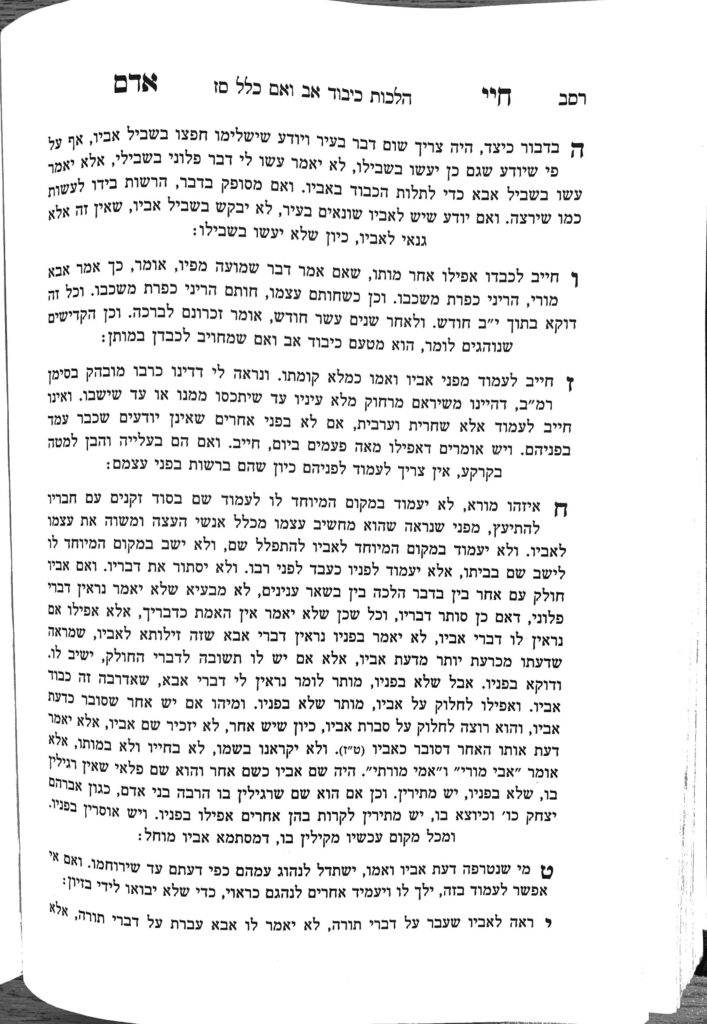We have finished siman 6, where we learned about how kibbud av v’eim applies after death, and how the primary way a child can bring kavod to their parents is by acting properly.
Many times, disagreements arise when two aveilim want to daven for the amud as an ilui neshama for a niftar. Regarding these conflicts, there is a beautiful thought brought by the Chasam Sofer. The Telzer Rosh Yeshiva, Rav Chaim Stein, ztl, shared this thought with Rabbi Reingold when he was in aveilus. The Chasam Sofer writes that whichever neshama is supposed to get the zechus from that particular tefillah, will receive the zechus regardless of which aveil davens. Thus, if Reuven was meant to daven, and for whatever reason, Shimon is able to get the amud, if Reuven is mevater, he has created an ilui neshama for the niftar by being mevater, and the niftar receives the zechus of the tefillah anyways. Thus, an aveil can only gain by being mevater in such a situation.
Another idea Rav Chaim Stein shared with Rabbi Reingold is that when an aveil is unable to daven for the amud, for whatever reason, they should learn an extra two mishnayos that day as an equivalent to saying kaddish. It is not clear to Rabbi Reingold how the zechusim equate, but this was the advice of Rav Chaim Stein, ztl. This advice was particularly pertinent during the height of Covid, when many shuls were completely shut and aveilim were unable to daven with a minyan.
In a situation where a person cannot daven for the amud, they can ask someone else to recite kaddish for them. It is brought down in halacha that the individual reciting kaddish should be paid, and preferably be paid from the money of the niftar. When the money is paid from the niftar’s estate, it comes out that the property of the niftar is what generates the kiddush Hashem brought about by kaddish, which brings about the zechus for the niftar. Similarly, if the child pays the money, the kiddush Hashem is generated through the child’s property, which can be viewed as an extension of the parent, as we have learned previously. Thus, although it is nice to offer to recite kaddish as a chessed, it is actually more beneficial for the niftar that the person saying kaddish accepts payment.
A person who is paid to say kaddish has no zechus to the amud over any aveilim, as the aveilim who are davening have a chiyuv kibbud av v’eim, which this individual does not have (see shiur 1322). If no one has a chiyuv, they are welcome to daven but are not obligated.
The Arizal explains that kaddish is an act of kiddush Hashem. When one recites kaddish or responds yehei shmei rabba, they are fulfilling the mitzvas asei d’Oraysa of venikdashti besoch bnei yisroel; that is, they are creating a kiddush hashem within the Klal Yisroel. The Arizal applies this idea to reciting and responding to kedusha as well.
Summary
- The Chasam Sofer learns that the niftar who was supposed to receive the zechus of their child davening for the amud will receive the zechus even if someone else ends up grabbing the amud.
- If one is unable to say kaddish, they should learn an extra two mishnayos in exchange.
- If one is unable to recite kaddish, they can hire someone to recite it on their behalf. The person hired should be paid, preferably from the niftar’s estate. The person hired has no zechus to daven from the amud over any other aveilim.
- Kaddish (and kedusha) are an act of kiddush Hashem. When one recites or responds to them, they fulfill the mitzvah of venikdashti besoch bnei yisroel.



